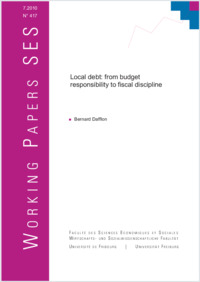Local debt: from budget responsibility to fiscal discipline
BP2-STS
-
01.07.2010
27
Accountability
fiscal discipline
fiscal responsibility
local public debt
balanced budget
borrowing
golden rule
pay-as-you-use
indebtedness
debt service
debt ratio
English
In the past thirty years, local governments in most European countries have been granted at least limited access to borrowing. The rules in force include limitations on the amount of borrowing and/or debt service, restrictions on the purpose of debt and on borrowing from foreign institutions and/or from the central bank. The description of these rules and sanctions constitute the thrust of several academic studies on local borrowing and debt. What are the ingredients that make it work efficiently? Fiscal discipline is not a simple question of having or not rules limiting deficits and debt. From "soft" to "hard" budget constraints, there are various degrees of severity. Dafflon (1995, 1996) proposed a catalogue of ten key issues that might help local policymakers examine their budget management practices upon whether they promote budget responsibility or not. The catalogue also permits to qualify the budget constraint from "soft" to "hard" whether it is self-imposed or imposed top-down. Based on these arguments, we consider budget discipline versus budget responsibility. Budget discipline is a forced and constraining approach to obtaining a balanced budget at decentralised levels. The corresponding positive approach is budget responsibility. The balanced budget as a result of a prudent and proactive budget policy through which local governments adjust their investment policy to their real fiscal capacity and assess costs and benefits of each capital programmes in advance, in order to avoid excessive debt.
- Collections
- Faculty
- Faculté des sciences économiques et sociales et du management
- Language
-
- English
- Classification
- Economics
- Series statement
-
- Working Papers SES ; 417
- License
-
License undefined
- Identifiers
-
- RERO DOC 27895
- RERO R007042568
- Persistent URL
- https://folia.unifr.ch/unifr/documents/302130
Statistics
Document views: 306
File downloads:
- Document: 385
